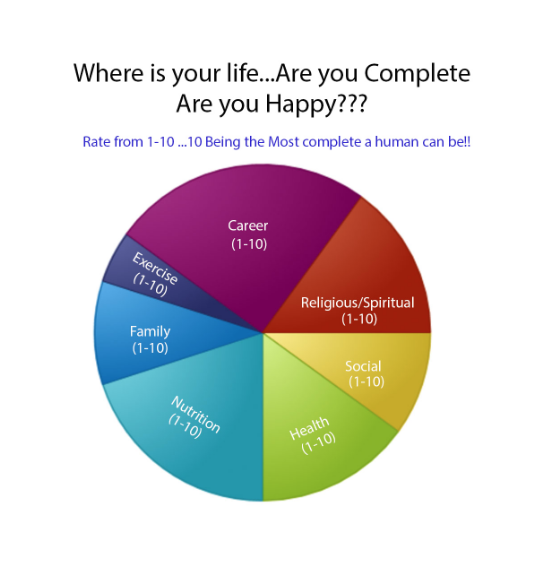Balancing the Scales
Learning Balance

What is the Right Balance?
As you were reading the previous section, I’m sure you were thinking about your own life, specifically how much time and effort do you put into the different areas. If you were, good⎯we’re going to do an exercise to see what life balance means to you. If you weren’t, that’s okay, because we’re going to do an exercise to see what life balance means to you.

Using the chart below, we’re going to look at where you are right now and then address where you want to be. First, write down the percentage of time you currently (don’t lie) spend on the different areas in your life. After you’re done with that, I want you to pretend that you only have one hour in your day. How would you divide the time among each of the life areas? Make sure it equals 100%.
Make a list Below to make points to add so you can get each number correct or Balanced.
If you are in the Fitness Retreat rate as if you were before you arrived here.
10 is impossible unless you have all tens. Why??
Go back to Your Goal section and add extra goals now that you have thought about each specific area of your life.

Career = _____
Exercise = ______
Family = _________
Nutrition = _______
Religious/Spiritual = _________
Social = _________
Health = _________
Sleep can affect our Balance, Weight Loss and Stress
- Set up a strict routine involving regular and adequate sleeping times (most adults need about seven or eight hours sleep every night). Allocate a time for sleeping, for example, 11pm to 7am, and don’t use this time for anything else. Avoid daytime naps, or make them short and regular. If you have a bad night, avoid sleeping late, as this makes it more difficult to fall asleep the following night.
- Devise a relaxing bedtime routine that enables you to wind down before bedtime. This may involve breathing exercises or meditation or simply reading a book, listening to music, or watching TV.
- Enjoy a hot, non-caffeinated drink such as herbal tea or hot chocolate. In time, your hot drink could become a sleeping cue.
- Sleep in a familiar, dark, and quiet room that is adequately ventilated and neither too hot nor too cold. Try to use this room for sleeping only, so that you come to associate it with sleep. In time, your room could become another sleeping cue.
- If sleep doesn’t come, don’t become anxious or annoyed and try to force yourself to sleep. The more aggravated you become, the less likely you are to fall asleep. Instead, try to clear your mind and relax. For example, I find that making myself feel grateful for something soon sends me off to sleep. Alternatively, get up and do something relaxing and enjoyable for about half an hour before giving it another go.
- Exercise regularly. This will also help you with your low mood. However, don’t workout too close to bedtime as the short-term alerting effects of exercise may make it harder to fall asleep.
- Reduce your overall stress. At the same time, try to do something productive or enjoyable each day. As da Vinci said, a well-spent day brings happy sleep (and a well- spent life brings happy death).
- Eat a wholesome evening meal with a good balance of protein and complex carbohydrates. Eating too much can make it difficult to fall asleep; eating too little can disturb your sleep and decrease its quality.
- Avoid caffeine, alcohol, and tobacco, particularly in the evening. Alcohol may make you fall asleep more readily, but it decreases the overall length and quality of your sleep.
- If insomnia persists despite these measures, speak to your doctor. In some cases, insomnia has a very specific cause such as a physical problem or an adverse effect of your medication that requires your doctor’s attention.
What types of things can you do to
get yourself in Balance?


